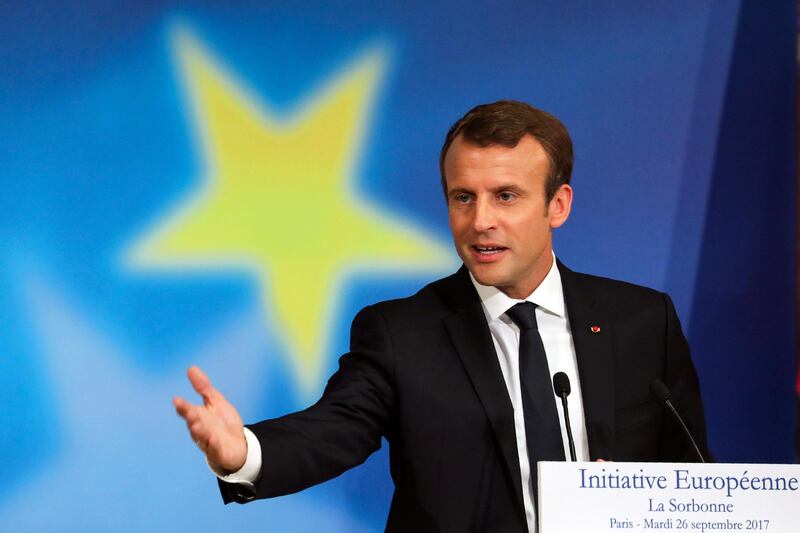Emmanuel Macron, the French president, called for a more closely-integrated Europe in a wide-ranging speech on Tuesday that warned of the dangers of splits following the departure of Britain from the 28-nation bloc.
Mr Macron called for much closer ties on economic, defence and immigration affairs as he accepted that pro-nationalist forces were on the march because of the failure to defend the European ideal.
“The Europe that we know is too slow, too weak, too ineffective,” he said.
In some of his most concrete proposals, the staunch pro-European said that countries that have adopted the euro – some 19 of the member states - should have their own budget for joint investment projects and to bail out countries in the event of future financial crises.
_______________
Read more:
[ Brexit: Macron tells May ‘UK must clarify three main issues before talks can progress’ ]
[ Britain’s May urges two-year Brexit transition deal ]
[ Would you trust a world leader to babysit your children? ]
_______________
The speech – strongly expounding the virtues of Europe while demanding change to its structures – comes at a key moment in the bloc’s history with the planned departure of the UK in 2019.
Mr Macron said he was looking for France and Germany to take the lead in setting the agenda for a new stronger Europe despite Angela Merkel emerging from national elections at the weekend with a weakened hand even though she secured a fourth term as German leader.
Analysts suggest she is likely to require to form a coalition with a Eurosceptic partner, limiting her ability to promote her view - similar to Mr Macron - of a stronger, more unified Europe without Britain.
After the return of a right-wing party to German parliament for the first time in 60 years, Mr Macron said the isolationist sentiment had returned “because of blindness… because we forgot to defend Europe.”
Despite the setback for his European ally, Mr Macron pushed for a series of major reforms in calling for deeper cooperation on matters including corporate taxation, its asylum policy and sharing intelligence between countries.
“The only path that assures our future is the rebuilding of a Europe that is sovereign, united and democratic,” Macron said in a speech at the Sorbonne university in Paris. “At the beginning of the next decade, Europe must have a joint intervention force, a common defence budget and a joint doctrine for action.”
In Berlin on Monday, Merkel said it was important to move beyond catchphrases and provide detail on how Europe could be improved. “It is not about the slogans but what lies behind them," she said. "I am talking about this with the French president."
The Macron speech followed a London meeting between Theresa May, the UK’s prime minister, and Donald Tusk, the European Council president. He said that he was “cautiously optimistic” about the progress of Brexit talks with a new realism emerging in the UK at the likely implications for leaving the bloc.
He said, however, that not enough progress had been made on issues such as the price that the UK would have to pay to leave the EU that would allow talks to move on to issues such as the nature of any new trading arrangement.






